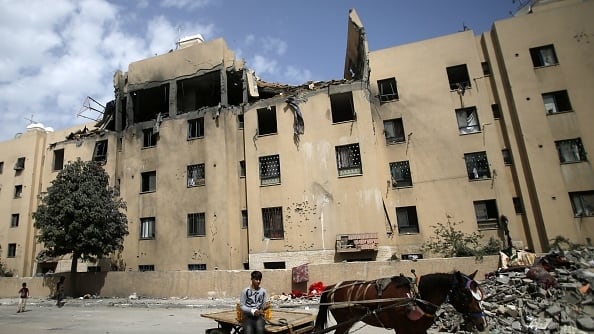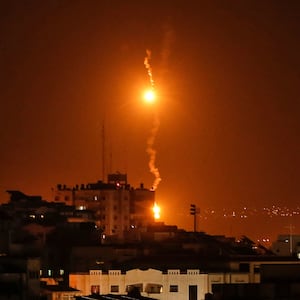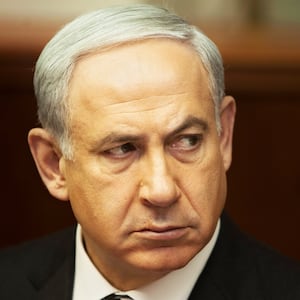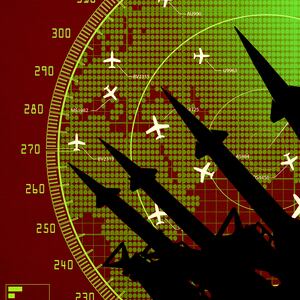ASHKELON, Israel—Three out of the four Israelis killed during the weekend war between Israel and Hamas were hit by rockets that landed in this beach town, which has the sixth-largest population in Israel.
It was the heaviest bombardment from Gaza since the 2014 war, with almost 700 rockets launched into Israel in 48 hours, leading to a strange cacophony: the silence of the empty city, the rustle of the breeze coming in from the Mediterranean, the wail of sirens, the tremble and roar of explosions, the whistle of missiles flying overhead and the non-stop muffled booms of Israel’s miraculous Iron Dome anti-missile system buffeting the ancient city like an external heartbeat.
The mini-war ended Monday at 4:30 a.m. in an internationally brokered ceasefire agreement that neither side acknowledges.
ADVERTISEMENT
About 23 Gazans were killed by Israeli bombardments, which followed an incident Friday when, according to the Israeli army, a sniper targeted, shot, and wounded two Israeli soldiers stationed at the border.
The Israeli military usually emphasizes Hamas’ responsibility for any incident emanating from Gaza. The group, closely affiliated with the Muslim Brotherhood, has ruled the Gaza Strip for a dozen years. But this time the Israelis chose to underline the claim that Palestinian Islamic Jihad, (PIJ) a rival militia, had targeted its troops.
The point was made so insistently, and so ham-fistedly, that radio announcers were forced to ask military spokespeople what “gep”—the Hebrew pronunciation of PIJ, a military acronym—meant.
Set adrift into a chaotic messaging arena, veterans drafted to work in the military spokesman’s bureau were explicitly told not to highlight the civilian casualties.
Israel’s Prime Minister Benjamin Netanyahu has no spokesman, and despite his usual propensity for compulsive video posting and unembarrassed abuse of live television broadcasts, he has yet to say a single word to Israelis.
In its Monday editorial, entitled “Why Netanyahu Keeps Mum” the daily newspaper Haaretz noted that four Israelis “have paid with their lives for Netanyahu’s no-policy policy.”
“He knowingly lies when he offers military action as the ultimate solution,” the editorial states. “Netanyahu, who boasts of his expertise in maneuvering political pressure to his benefit, can and must initiate a bold diplomatic move and present to Hamas, through Egypt, a worthy plan that will liberate Israelis from the threat in the south.”
This is unlikely to happen.
Netanyahu, who won a closely contested re-election last month, has yet to piece together a governable coalition, and faces a deadline far more threatening to him than Hamas or even the anger of Israeli voters: Avichai Mandelblit, his own attorney general, who is scheduled to indict the prime minister on several corruption charges in only two months.
Netanyahu’s potential coalition partners fall into two camps: those who will not sit in a cabinet led by an indicted prime minister—a situation without precedence in Israeli history—and those for whom the looming indictments constitute the perfect leverage to try to wring radical promises from him.
After 12 years of misery and stagnation, the Islamist factions in Gaza also know what makes Israel tick.
Hamas leader Yahyeh Sinwar spent 22 years in Israeli jails and is fluent in Hebrew. He can’t choose the members of Israel’s next government, but he could “ramp up the pressure on Israel, knowing it cannot escape its commitments, both domestic and international,” wrote Elior Levy, the Palestinian affairs analyst for the daily Yediot Ahronot.
“The timing of this round could not be better for [Sinwar], with Israel about to mark Memorial Day, celebrate its 71st Independence Day, and host the prestigious Eurovision Song Contest, which if canceled, will reflect badly on the country and impact Israel’s economy and tourism.”
You read that right: the Eurovision Song Contest, a major global event almost unknown in the United States, is scheduled to take place in Tel Aviv between May 12 and 18.
Eurovision is the biggest, kitschiest, brassiest reality show—and launchpad for ABBA in 1974—and casus belli you never heard of.
Last week, before violence erupted, the Lebanese newspaper Al-Akhbar quoted Gazan militias claiming that Israel’s failure to implement tacit understandings aimed at easing the blockaded enclave’s economic misery would lead to increased attacks on the border and “rockets raining on Tel Aviv that will wreck Eurovision.”
Palestinian Islamic Jihad openly threatened Eurovision, which, in addition to the offense of occurring in Israel this year, is a celebration of everything PIJ hates: loud, profane music, tiny, sparkly clothes, men and women in joint revelry and worst of all, gay men.
Among other preparations, the City of Tel Aviv and the food crowdsourcing startup EatWith have organized a “Proud Shabbat Dinner” for Eurovision visitors, where for only $12 you will be invited to partake of an “LGBTQ friendly Shabbat dinner at a host family’s home.”
Israel’s south is Netanyahu country, and residents of the urban north are often frustrated by the stalwart support Bibi, as the prime minister is known among Israelis, receives from the battered border communities. In one of hundreds of angry Facebook posts, one user wrote “Dear residents of the south, while you’re running to the bomb shelters just don’t forget Bibi gives good speeches in English.”
At an almost empty café in Ashkelon, manager Shem-Or Shaya said that “some kind of significant military engagement is needed.” Netanyahu, he said, should be made to keep his promise that “life in Tel Aviv has the same value as life here.”
Ashkelon Mayor Tomer Galam, wearing a bulletproof vest, addressed residents from a factory in which two laborers were killed by a rocket. Eliyahu Gvili, a 75-year-old retiree who came to see the scene, said his message to Netanyahu was “hold firm.”
But he also pleaded, “Don’t listen to everyone who is calling for war. No military operation. We don’t want it. The life of a single young soldier isn’t worth losing over Gaza. Let the missiles fly over here and kill us old guys.”
The 2014 war lasted for six weeks. Over 2,000 Gazans were killed, and Israel lost 67 soldiers, mostly young draftees the age of Gvili’s grandchildren, as well as six civilians.
In Maariv, a conservative newspaper, Netanyahu biographer Ben Caspit summed up the truncated, apparently purposeless battle over the weekend by concluding that “the prime minister has no idea what he is doing in Gaza.”
Israel, which “negotiates with Hamas and Palestinian Islamic Jihad while under fire as a matter of routine,” he wrote, “is subject to extortion, and is terrified of the possibility that Eurovision will be canceled or the Independence Day ceremony will be marred.”
Israel’s Independence Day, including a marquee event at which Netanyahu must speak in public, takes place on Thursday, May 9.
In Israel Hayom, which is a house organ for Netanyahu’s rule like Fox News is for Donald Trump’s, the political analyst Yossi Yehoshua blasted the prime minister under the fiery headline, “A Hostage to the Eurovision.”
Memorial Day, Independence Day, and Eurovision are holding the army back from responding to 700 incoming rockets “with the necessary force,” Yehoshua argues
The reason Israel is subject to extortion, “is the Eurovision Song Contest, a trap that restricts Israel from responding strongly, since any large-scale attack by the Israeli air force could exacerbate the rocket fire from Gaza and prevent the European delegations from arriving at the competition in Tel Aviv.”
No matter that most of the competitors are already in country, touring and Instagramming their Israel adventure.
Concerned by mounting criticism of an interim government allowing its citizens to die in choreographed rocket-fire provoked by a song contest, Israel's minister of regional cooperation, Tzachi Hanegbi, told a Sunday radio program a fib: that no ceasefire negotiations were underway.
The competition, he added, was not a factor in the government’s thinking.
“Eurovision, which is a cultural event, cannot be a concern,” he said. “In general, Israel doesn’t have an interest in launching a full-scale military campaign… but it wouldn’t occur to me that in a cabinet meeting, or a security forum, they would consider a musical event, an entertainment event.”
As Egypt, Qatar, and the United Nations raced to formulate a cease-fire agreement, Gilad Erdan, Israel’s police minister, asserted that “Eurovision is not a factor from our point of view.”
Netanyahu’s Eurovision nightmare is far from over, however.
On Monday, United Torah Judaism, one of the parties he needs if he will lead Israel’s next government, abruptly canceled a meeting with the prime minister on the grounds of “the Sabbath desecration during the Eurovision.”









